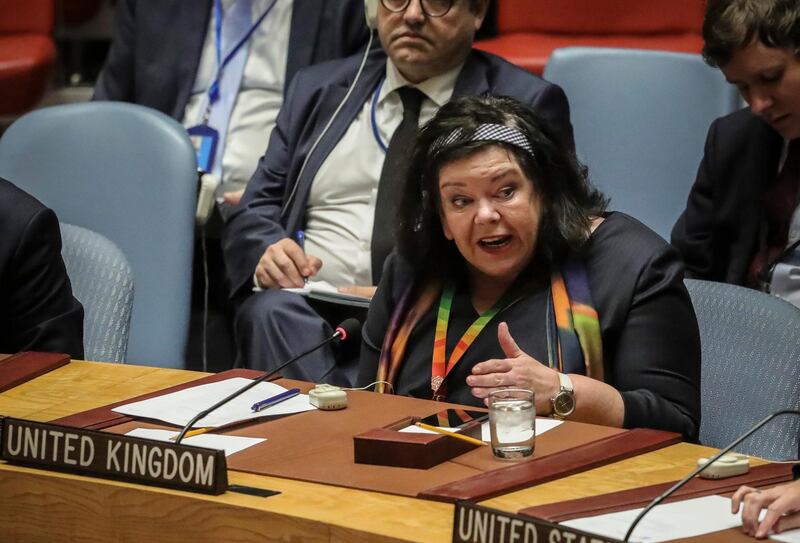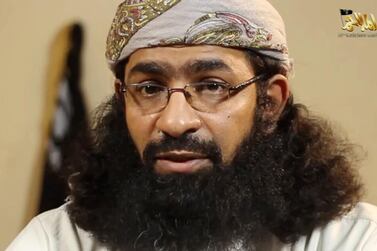The UN Security Council on Tuesday renewed its sanctions regime on Yemen for another year after tense negotiations between Britain and Russia.
Russia threatened to veto any mention, even implicit, of Iran in the resolution.
Thirteen countries adopted the resolution on the sanctions, which now are in effect until February 2021. Russia and China abstained.
The sanctions plan, which would have expired on Wednesday, includes the extension of the mandate for UN experts who monitor the arms embargo imposed in 2015.
It also extends the measures that allow the freezing of assets and travel bans on officials.
Talks had been continuing for a week with little apparent difficulty, but suddenly on Monday Moscow said it could not support the text drafted by Britain.
A recent report from the UN said the Iran-backed Houthi rebels had, since 2019, held new weapons including drone and cruise missiles with "technical characteristics similar to arms" produced in Iran.
The report did not say whether the weapons were delivered to the Houthis by the government in Tehran, which has repeatedly denied sending them.
The United States and other Western powers have long accused Iran of supplying weapons to the Houthis.
"Not only does Iran continue supplying weapons to the Houthis, but they are also increasing the sophistication of these weapons," U.S. diplomat Rodney Hunter told the Security Council on Tuesday.
Shortly before the vote, and after France and Belgium stepped in to mediate, Britain agreed to omit any reference to the arms held by the Houthis and their similarity to Iranian weapons.
The UK’s Permanent Representative to the UN, Karen Pierce, said she was pleased the resolution had passed but warned of the risk “that the veto becomes simply a negotiating tactic”.
“If countries are going to engage in negotiations with us in detail and then not support the text, then that in my mind is sharp practice,” Ms Pierce said.
"Other colleagues around the table have compromised. There's a risk to the Security Council in that sort of behaviour. There's a risk that it can't step up to its responsibilities.”
In the resolution, the council expressed "serious concern at the devastating humanitarian situation in Yemen and all instances of undue hindrances to the effective delivery of humanitarian assistance, including the recent interference in aid operations in Houthi-controlled areas."
The last-minute deal came amid growing concern internationally about the activity of the Houthi rebels.
Donors and aid groups are planning to suspend humanitarian aid to areas of Yemen controlled by the Houthis in the coming months if the group does not stop hindering the delivery of assistance, a senior U.S. State Department official said on Tuesday.
Aid agency sources told Reuters earlier this month that Houthi authorities in northern Yemen were obstructing efforts to get food and other help to those in need, to an extent that was no longer tolerable, and that operations would be scaled down.
The senior US State Department official, speaking on condition of anonymity, confirmed those plans.
"Each donor and implementer is drawing up plans on how to, what to do if the Houthis do not change their behaviour on the ground," the official said. "The plans involve suspending a lot of assistance programs with exceptions for truly lifesaving programs feeding sick children and things like that."
The official added: "Everyone's looking at a timeline of a month or two. ...That's the point at which different implementers will start to suspend some of the programs."
The United Nations describes Yemen as the world's biggest humanitarian crisis and says millions of people are on the verge of starvation. The world body did not immediately respond to a request for comment on whether it was planning to suspend some operations to Houthi-controlled areas.
Aid agencies have for the past year publicly and privately complained of worsening operating conditions, lack of travel permits and other access restrictions.
"It can't be tolerated anymore," the State Department official said.
The US Agency for International Development (USAID), a major donor, said it was extremely concerned that the Houthis had worsened the effects of the crisis by interfering in aid operations.
"We are urgently working on a way forward that allows US aid to continue uninterrupted, but are taking steps to plan ahead with our partners so they can safely and responsibly adjust programming should we be forced to reduce aid," said acting USAID spokesperson Pooja Jhunjhunwala.
“We continue to do everything we can to avoid a reduction in aid in northern Yemen,” the agency said.
The US provided about $700 million in aid to Yemen last year. It is among the largest donors to Yemen, where a UN aid program totalling $8.35 billion since 2015 is vital to keeping many Yemenis alive. The UN calls the situation in Yemen the world’s worst humanitarian crisis.
As the war in Yemen enters its sixth year, 10 million people in the country are on the brink of famine and 80 per cent of the population of 29 million need of aid, according to the UN. More than 3 million people have been displaced, cholera epidemics have killed hundreds, and at least 2.2 million children under 5 suffer from severe malnutrition, the agency said.
Yemen’s Houthi rebels, who control most of northern Yemen, have blocked half of the United Nations’ aid delivery programs in the war-torn country – a strong-arm tactic aimed at forcing the agencies to give them greater control over the humanitarian campaign.







